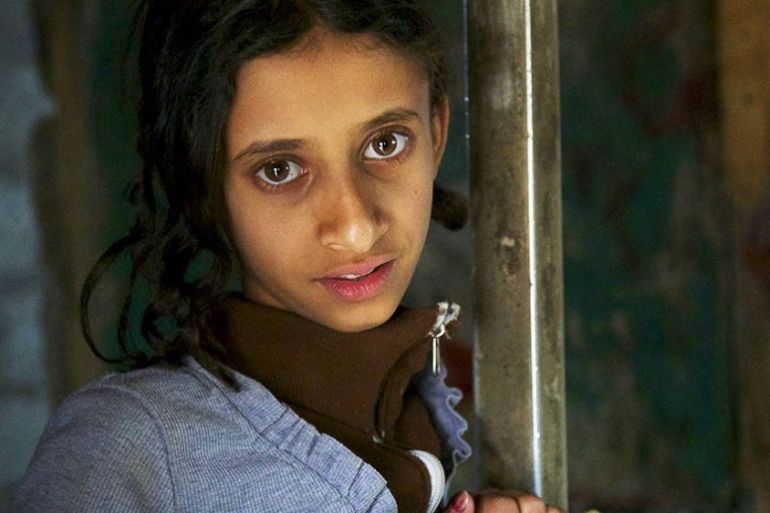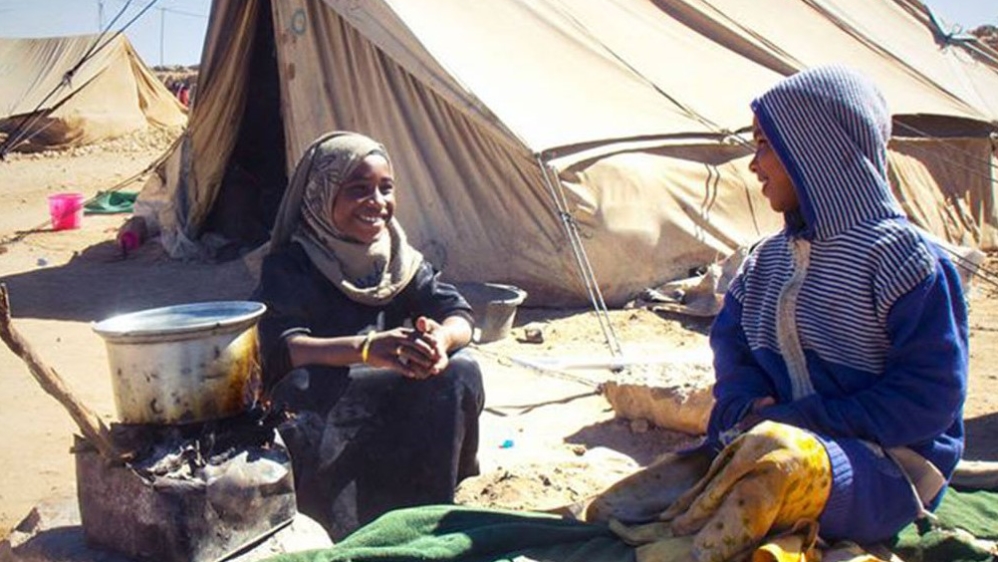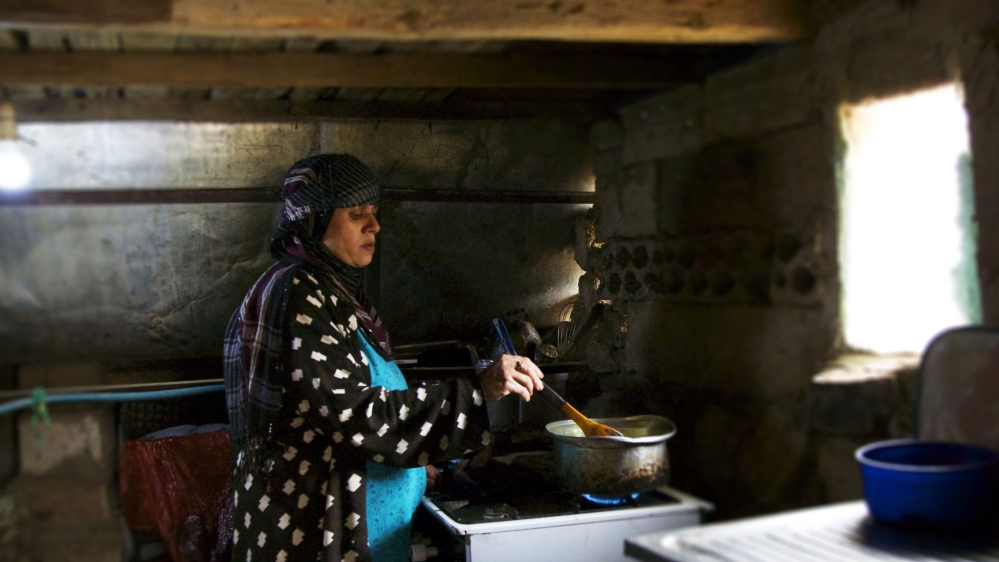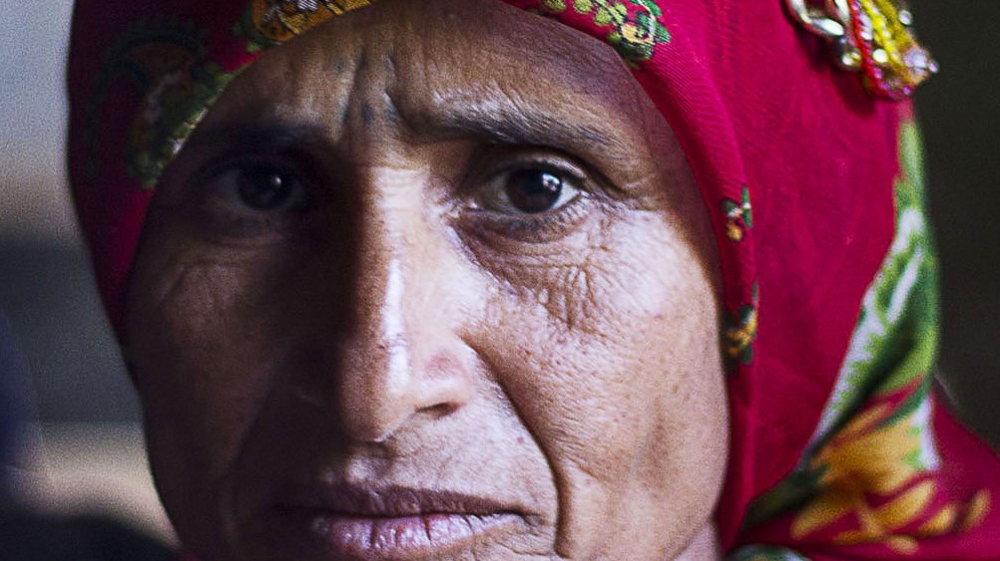‘Women like us’: On women and war in Yemen
Four Yemeni women share their experience of the war, their struggles and aspirations.

The idea of documenting women’s lives during a conflict is not new. However, these stories remain under-reported in Yemen, a country torn by war and conflict.
In the photo series “Women Like Us”, visual storyteller Thana Faroq captures the stories of women from different social status and class in Yemen and their experience of the war – their struggles, their aspirations, and their ambitions.
While each woman has suffered the war differently, yet they all share a sense of hope and resilience.
Here four Yemeni women share their stories about what has changed in their lives due to the conflict.
![Om Nawal's dream of a healthy, happy family seemed so distant to her [Thana Faroq/British Council]](/wp-content/uploads/2016/09/8b124686ee19451289c2c3a06c1fce90_18.jpeg)
‘There’s a huge burden on my shoulders’
Om Nawal, 48, was raised with a big family in a small village. She got married and had her first child when she was 15 years old. “I didn’t mind the heavy burden of housework, cooking and taking care of a hard tempered man. I didn’t aim for much – or let’s say I wasn’t allowed to,” she said.
|
The war made me discover my life hasn’t been great, it never was, but I still held a hope that I have now lost. It’s a feeling mixed with loss, fear and deflated dreams. |
When she gave birth to her first child, Om Nawal says that she promised herself that no matter what happened, she would make a happy family. “Years and years have passed and I still haven’t fulfilled this dream.” She has two daughters, both of whom face severe medical problems with their kidneys.
She looks after her two girls, her grandchildren, and her husband, who lives with them but does not provide any financial support. Then, if there is any time, or food, or money left, Om Nawal takes care of herself.
“I wanted to make my girls happy, and look what happened: My girls have severe kidney problems,” Om Nawal said. “Now that we are surrounded by war I sometimes feel that I want to quit, but I can’t.”
One of her daughters has only one kidney. She is divorced, with two children, and has no means of support. Her other daughter is a housemaid. “There’s nothing to be ashamed about but I wish that she doesn’t have to,” Om Nawal said.
There was a long silence. Om Nawal was struggling to express her pain, as if it was something she was accustomed to locking away. Her house was painfully cold.
Heating was not an option, she said, because they can no longer afford to buy fuel. “Winter has been too aggressive on us this year,” she said. “Even a simple dream like having warm water becomes a luxury.”
![The war did little to shake the love Om Nawal has for her family; [Thana Faroq/British Council]](/wp-content/uploads/2016/09/7084455cffd44a209a5c5ed7bd637a12_18.jpeg)
Among all the women photographed on this journey, it was striking how Om Nawal would get lost in cluttered thoughts. Her dream of a healthy, happy family seemed so distant to her, and her thoughts so filled with perpetual sorrow.
“The war made me discover my life hasn’t been great, it never was, but I still held a hope that I have now lost. It’s a feeling mixed with loss, fear and deflated dreams. I am not sure if anyone else understands,” she elaborated.
“Other women tell me that I should remember the privileges I am blessed with during this rough time. But why should we endure this? There’s a huge burden on my shoulders that no one else could understand, only women like me will.”
Though she has lost the hope she once had, the war did little to shake the love Om Nawal has for her family. “It has been difficult to keep things moving in these unsettling times but I keep pushing through,” she continued. “I keep motivated, and smile through the times where I can’t stop weeping.” “Making a happy family is still a goal that I am chasing even if that means I go to sleep hungry,” she said.

‘War is humiliating’
Hajjah governorate, northeast of Sanaa, is a major host of Yemenis displaced by the war.
A great many of the internally displaced people in Hajjah arrived from Saada, the Houthi fighters’ stronghold and the most heavily bombed area in Yemen. Locals, already struggling to cope with the blockade imposed on the country, are heavily burdened by the influx of internally displaced people and refugees.
|
|
| “We can’t afford meals any more, bread and tea is the most we can offer.” [Thana Faroq/British Council] |
Khamisa, 45, lives in a small, straw-roofed shack – ubiquitous in the area. The shack provides little shelter from the cold winter. Khamisa was hosting about 10 relatives who have come from relatively harder hit areas, especially Saada.
|
War is very humiliating. In a moment you lose everything and what is left are pieces of a broken soul. |
She looked exhausted when asked how her family is coping with the war. “My relatives came from all over,” she said. “We welcomed them and help them as best we can, but life was already tough on us before they arrived.”
“We didn’t have enough to feed ourselves,” she continued. “Now we have to share everything with them. We can’t afford meals any more. Bread and tea is the most we can offer.”
Khamisa explained how she was forced to sell her most prized possessions, her sheep, in order to be able to feed her children. “War is very humiliating,” she said, now in tears. “In a moment you lose everything and what is left are pieces of a broken soul.”
![Khamisa is looking after about 10 relatives in her small shack [Thana Faroq/British Council]](/wp-content/uploads/2016/09/cb7ba525aa074489a1f057df9f1ca4c5_18.jpeg)
‘My little girl whom I named spoon’
Since the war began in Yemen, millions of people have fled their homes. Carrying little more than the clothes on their backs, they set off in search of shelter and, for many of those whose houses were destroyed, a new place to call home.
Women and children have been hit the hardest and many of the poor among them do not even have a roof over their heads. In a camp for the internally displaced in Amran city, sat Hafsa with her newborn baby.
!['I really miss my home. My home wasn't well furnished or anything, but it was my own kingdom,' Hafsa says [Thana Faroq/British Council]](/wp-content/uploads/2016/09/5579d34aed5f4378905bccafe61fda68_18.jpeg)
Hafsa and her family left so much of their lives behind when they fled their homes during the war, but brought with them the little things that make up their culture and identity, like the special bakhoor, incense bricks that are burned.
Their tent was clean and organised, a temporary home in a little community trying to make the best of a very bad situation. And very bad it is.
|
My children ask me every day, ‘When are we returning home?’ but I don’t know what to say to them. |
There were no clinics or doctors in the camp, Hafsa, in her late 20s, had to travel to the city to give birth in a hospital. She explained her family’s reason for leaving their home in Haradh, near the border of Saudi Arabia, and what she has been going through since.
“We couldn’t stay there any longer. Death was approaching from everywhere. I did not want my children to suffocate under the rubble. What if they screamed under the rubble and no one heard them? What if they became orphans? What if I lose them? When you are a mother, your life completely stops for your children. Us women were born to care, to shelter, to embrace our pain. These last months have been hell.
“I thought I would lose the baby. I was not well fed, I was sick most of the time. I wasn’t eating healthy and I suffered from bleeding during the early stages of my pregnancy. I really miss my home. My home wasn’t well furnished or anything, but it was my own kingdom. My children ask me every day, ‘when are we returning home?’ but I don’t know what to say to them. The answer might be never, and I am not sure they will be able to handle it.”
There was a pause as she gazed down at the tiny newborn she held in her arms. Sensing the need for a change in topic in a more lighthearted direction, I asked: “What did you name your baby girl?” “I named her Spoon,” she replied. She went on to explain: “I was inspired by my empty stomach, by hunger.”

‘I miss having a good laugh’
The rooms of Katiba’s family house are small and disorganised, as if they were built with an assortment of whatever her family could find or afford. Sunlight crept in through a few tiny holes in the wall, but the house was as cold as it was unfinished.
“A home is made up of love, companionship and patience, not walls and bricks,” Katiba remarked.
For the mother of five, it was more than a house. It was a home her family had built from the ground up. A safe haven that Katiba, who has another child on the way, is afraid to lose.
Her children, who are all under 13 years old, are at school. She was very pleased that they could return after a long break during the war.

“My children were happy that they didn’t have to do homework for a few months, but something was missing in their lives,” she said. “Not going to school meant feeling insecure about the current situation and the future,” said Katiba, who is herself illiterate. She believes strongly in the power of education and hopes it can bring peace and a better future to her children’s lives.
She pointed out that even when school was closed she ensured her children reviewed their schoolwork regularly. “I love that my children attend school. I am happy that my girls get to do things that women who are my age couldn’t do when they were young,” she said.
![Katiba believes strongly in the power of education and hopes it can bring peace and a better future to her children's lives [Thana Faroq/British Council]](/wp-content/uploads/2016/09/61b78b407c5b45ad80059d1d5b80964d_18.jpeg)
|
There were many times when I could not stop crying. My children are still too young for me to share my pain with them. |
When the war in Yemen began, Katiba took on a lot of extra responsibility at home. Her husband works late night shifts as a security guard and cannot afford to take time off.
During the heavy bombings, which for the past year have occurred most nights, Katiba said that she has to calm the children and maintain peace at home to ease the pressure on her husband.
She also takes care of her elderly mother who lives with them, and struggles to feed the children with the limited resources they have. “Every time I have lost my strength during this difficult time I remember, if I don’t do this who else will? Our responsibilities go far beyond cooking and washing the dishes,” Katiba said.
A month later, at home with her children, Katiba’s family can barely afford to have rice or bread for lunch any more, she said. Having a variety of dishes seemed like a long lost luxury. Katiba looked more tired.
She spoke about the severe depression she suffers from and the complications she is facing with her pregnancy. Katiba is in serious need of medical help but her family does not have enough money to pay for something as routine as a visit to the doctor.
Even if they did, Katiba said she would rather save it in order to feed the children. “There were many times when I could not stop crying,” Katiba said, questioning when the war will end and what will come next. “My children are still too young for me to share my pain with them.”
“I need this [war] to be over, I miss having a good laugh,” Katiba said. “I don’t recall the last time I laughed from the heart.”
This project was commissioned by the British Council in Yemen
